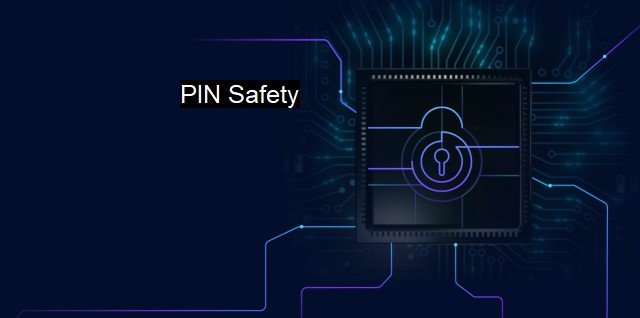What is PIN Safety?
Importance of PIN Safety: Maintaining Cybersecurity and Protecting Online Presence
PIN safety, in the cybersecurity context, plays a critical role in the proactive protection of sensitive personal and financial data. PIN, an acronym for Personal Identification Number, is regularly used as an authentication method in various systems and platforms, including ATMs, mobile devices, and online banking.Cybersecurity underscores the importance of PIN safety because of its basic role: to serve as an individual's digital signature. Any unauthorized access or breach could potentially expose an individual's confidential information leading to identity theft, financial loss, among others - an uneventful occurrence antivirus technologies persistently work to prevent.
Maintaining PIN safety goes beyond just securing the digits that serve as your code. It also involves thoughtful and strategic generation of these numbers. Most people, for convenience, decide to use personal information like birthdays, anniversaries, or easy-to-remember number sequences when producing their PINs. with today's internet-connected world and the wealth of information accessible online, these form a less solid security barrier than truly random numerical selections. This practice can engender a sense of false security leading to disastrous outcomes should a hacker decipher these personal predilections.
A critical piece of shielding your digital assets involves having multiple PINs for different accounts. Implementing the same PIN across various platforms increases the risk level tremendously, giving unauthorized entities an all-access pass once a single PIN is compromised. Although remembering multiple PINs may present a bit of a challenge for users, the safety it guarantees vastly overshadows any inconvenience.
When discussion turns to PIN safety, one can't underemphasize the significance of PIN confidentiality. As a general rule, each individual is strongly advised against sharing their PINs with others. This embargo extends to online platforms and calls allegedly from the bank or any financial institution. Some searching individuals might claim to call from these organizations, but it's critical to know that valid entities do not usually ask for your PIN. No one else should possess your PIN to avoid untoward situations.
Currently, most industries utilize firewall and antivirus applications as part of their day-to-day defense system. Many cybersecurity solutions protect their clients by encrypting the keypads on ATMs or digital keypads online. Consequently, even if malware infects the terminal or device one is using, the PIN remains secure due to the encryption offered by the antivirus program. It's just as crucial to update these antivirus programs regularly as these updates keep them effective against newly emerging threats.
The final enforcer of PIN safety is the direct user, who must comprise the understanding that he/she will incur the most loss when a PIN is mishandled. For this reason, it's always best to conceal a PIN while typing it into a keypad - both digital and physical.
Regularly updating the PIN ensures it remains formidable. While it's not necessary to alter it routinely, changes should be made in situations where it may have been compromised, for instance, losing a card or a device, or an indication of unauthorized logins.
Still, the emphasis should be on creating a strong, unique PIN in the first place. With a strong PIN entered securely, the antivirus may continue its function without interruption, continually safeguarding the system against viruses, malware, and hack attempts aiming to secure unauthorized access.
PIN safety is an integral part of cybersecurity, incorporating the disciplined and strategic selection, usage, and protection of our Personal Identification Numbers. Antivirus programs can provide robust backups, yet the individual user embodies the primary line of PIN safety defense.

PIN Safety FAQs
What is pin safety in cybersecurity?
Pin safety in cybersecurity refers to the measures taken to protect personal identification numbers (PINs) from unauthorized access or theft. This includes using strong and unique PINs, protecting them from phishing attacks, and never sharing them with anyone.Why is pin safety important in antivirus software?
Pin safety is crucial in antivirus software because it adds an extra layer of protection against unauthorized access to sensitive data. By having a strong and unique PIN, users can prevent hackers or malicious programs from gaining access to their antivirus software and altering its settings or disabling its defenses.How can I ensure my pin safety in cybersecurity?
To ensure your pin safety in cybersecurity, you should use a strong and unique PIN that is not easy to guess or brute-force. You should also avoid using the same PIN for multiple accounts or devices, and never share your PIN with anyone or store it in an insecure location. Additionally, you can use two-factor authentication (2FA) or biometric authentication to add another level of security to your accounts.What should I do if my pin safety is compromised?
If your pin safety is compromised, you should change your PIN immediately and notify your financial institutions or antivirus provider. You should also review your account activity and monitor for any suspicious transactions or changes to your antivirus settings. If you suspect that your device has been infected with malware or a virus, run a scan with your antivirus software and follow the recommended actions to remove any threats.| | A | | | B | | | C | | | D | | | E | | | F | | | G | | | H | | | I | | | J | | | K | | | L | | | M | |
| | N | | | O | | | P | | | Q | | | R | | | S | | | T | | | U | | | V | | | W | | | X | | | Y | | | Z | |
| | 1 | | | 2 | | | 3 | | | 4 | | | 7 | | | 8 | | |||||||